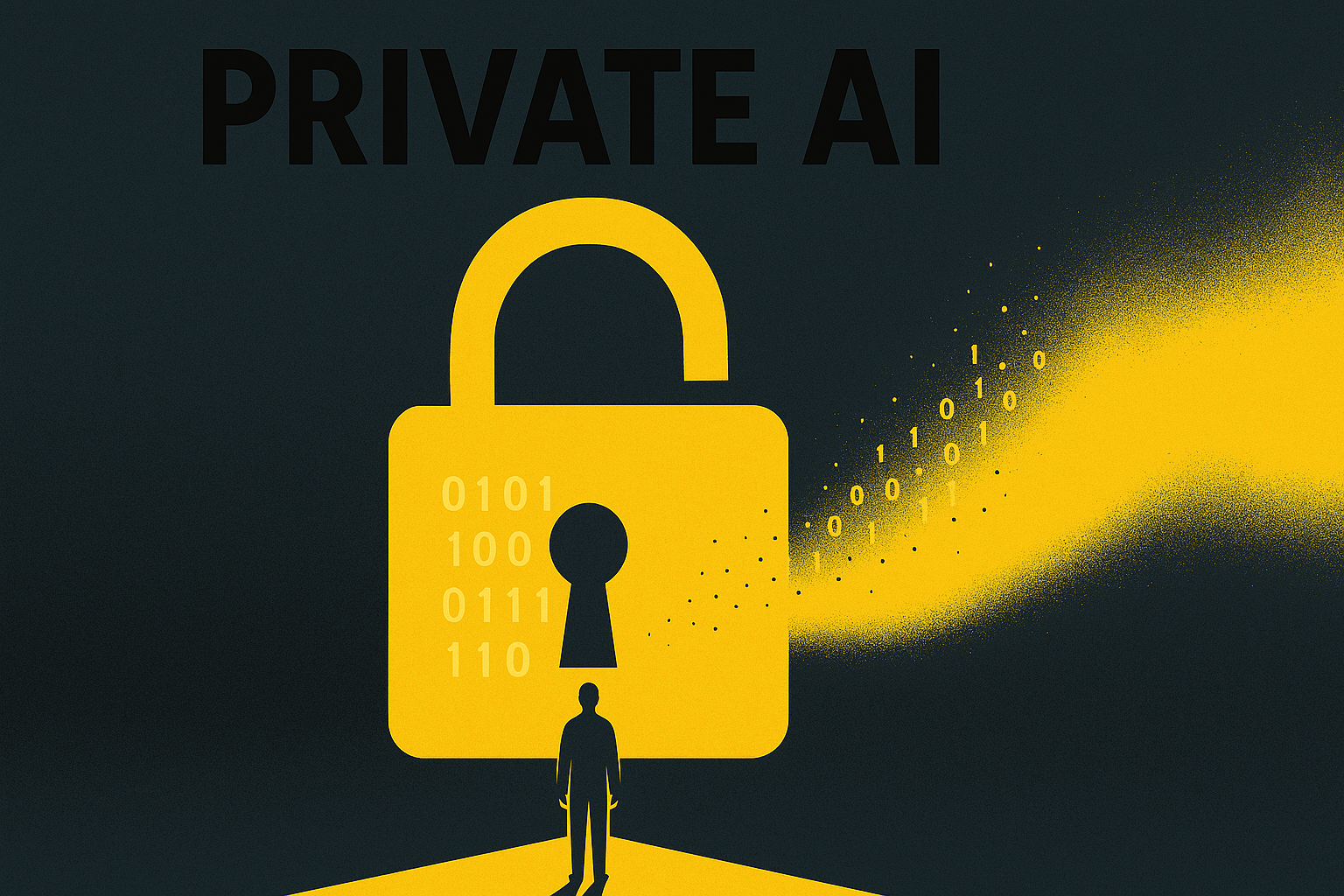
The Rise of Private AI: Taking Back Control of Your Data
Private AI and the Return of Control
If you've ever hesitated before typing something sensitive into ChatGPT or Gemini, you're not alone. Most professionals working within large organizations rely on employer-backed cloud tools that promise productivity — but quietly tether every query, every brainstorm, every idea to a corporate environment. That creates a new kind of lock-in: one where your intellectual property is not truly your own.
Nowhere is this more visible or important than in how knowledge workers use AI for private reasoning — salary negotiations, competitive analysis, or drafting notes about upcoming job interviews. These moments are inherently personal, yet the default AI infrastructure routes them through enterprise servers and compliance pipelines. That makes simple curiosity feel exposed.
The Pain Point: Corporate Lock-In as a Data Trap
Modern SaaS AI platforms aren't designed for individual sovereignty. Your data, prompts, and patterns are stored or logged to train systems that don't belong to you. Even if the platform claims anonymization, the core dependency remains: you can't access the model weights, the vector store, or the telemetry that tracks your inputs.
For business development and partnership professionals, this creates friction. Every exploratory negotiation, every draft pitch deck, and every hypothetical model of a deal could leak competitive insight simply because it passed through shared corporate infrastructure.
It doesn't have to be like this. You can keep your thinking private by deciding where your data lives before you start typing. ChatGPT and Gemini both let you focus their attention on specific documents—stored either on your machine or in your own cloud. A few organized files go a long way. Collect your notes, drafts, and background material in one folder, and let the model work from that local or personal dataset instead of sending everything into a broader environment.
What We Recommend: Practical Private AI
Private AI doesn't mean going offline or disconnecting. It means deploying orchestration — the ability to run and chain AI models, tools, and datasets locally or within user-controlled environments. (Orchestration refers to connecting multiple models and utilities into a coordinated workflow, much like how cloud platforms operate—but under your control.)
This concept of orchestration isn't limited to AI—it applies to strategic partnerships as well, where coordinating multiple stakeholders and capabilities creates compound value.
Practical steps:
- Start with RAG (Retrieval-Augmented Generation). RAG lets AI models pull in relevant information from your documents to answer questions or generate content. Setting up RAG locally is the simplest way to move beyond chatbot interfaces — your data stays private while you benefit from powerful search and summarization.
- Run models locally. Frameworks like Ollama and LM Studio make it easy to host models such as Llama 3, Phi-3, or Mistral on a personal machine — no cloud subscription required.
- Create a local vector store. Tools like ChromaDB or SQLite with pgvector allow you to search across your notes, contracts, and emails while keeping data encrypted and offline.
- Use orchestration layers. Projects such as Open WebUI and LangChain enable the same "chat + memory + plugin" architecture big platforms use — but locally.
- Adopt encryption as default. With Apple's Secure Enclave, iCloud Keychain, or standard AES storage, your embeddings and transcripts remain unreadable even if accessed.
Real-World Use Case: The Private Negotiation
Imagine preparing for a salary review. You want to test phrasing, rehearse responses, or analyze market data without broadcasting intent to your company's compliance systems. A private AI stack lets you run a local LLM, feed in your notes, and orchestrate simulated dialogues safely.
Orchestration as Leverage
The concept of orchestration — connecting multiple local models and utilities into a single reasoning workflow — is what transforms private AI from novelty to necessity.
It allows you to:
- Pull structured data from files or notes into context windows
- Chain reasoning steps across small, specialized models
- Maintain continuity across sessions without sending data to the cloud
- Keep SOME metadata and data private (but not all), and thoughts private
In short, orchestration is how individual professionals reclaim autonomy in an AI-saturated workplace.
Why This Matters Now
Every enterprise AI initiative claims to empower its employees. But empowerment without ownership is illusion. If your intellectual property lives inside your employer's model, you don't own your own thought process.
Private AI restores that balance. It enables people — especially those in partnership, sales, and strategic roles — to experiment, ideate, and negotiate with full confidentiality.
Further Reading & Resources
- What's RAG? (YouTube)
- Open WebUI: Host a local chat interface
- LangChain: Chains of prompts, memory, and tool access
These videos show how a local stack is practical (and somewhat easy to stand up). You can maintain privacy without compromise, keeping your thoughts and 'memories' where they always should be: in a private space.
The Invitation
If you're already using AI tools daily, ask: Who owns the memory of your work? How private do you want your thoughts to be? As always - sometimes the metadata is more important than the actual data.
For individuals:
Reach out directly to share your experiences or discuss how you can take back control of your data and build a private AI stack that works for you.
For organizations: Ready to give EACH of your employees superpowers?
Let's discuss how you can implement secure, private AI solutions that give you back control of your data and intellectual property while empowering every team member with private AI capabilities.
Start the Conversation →